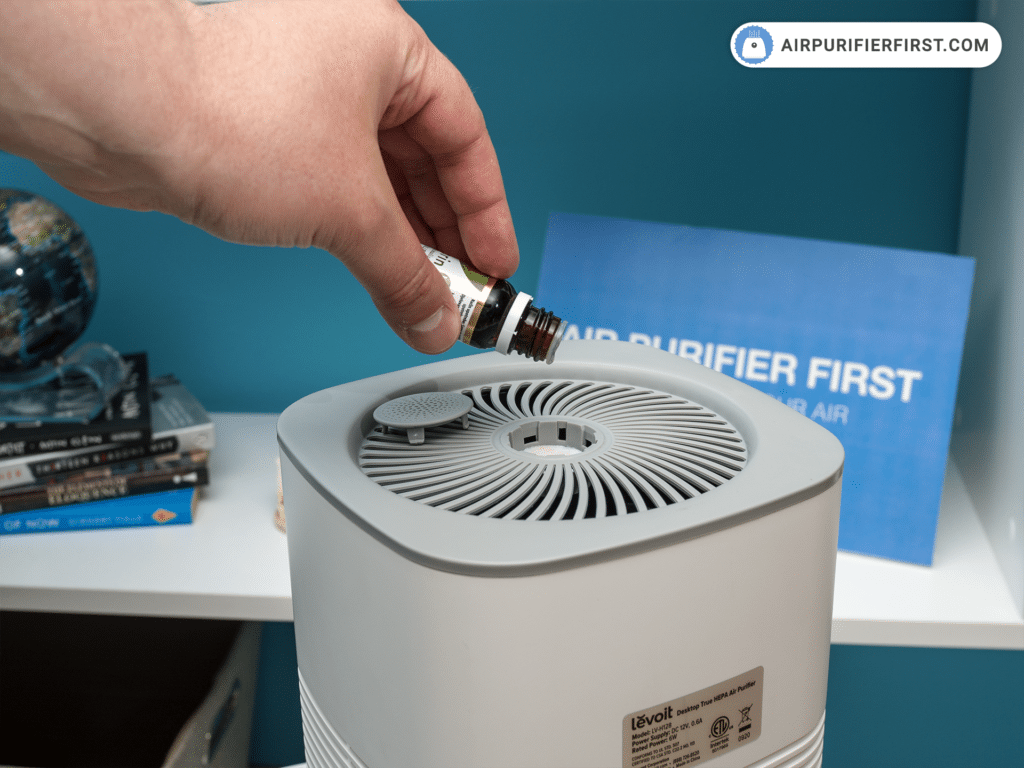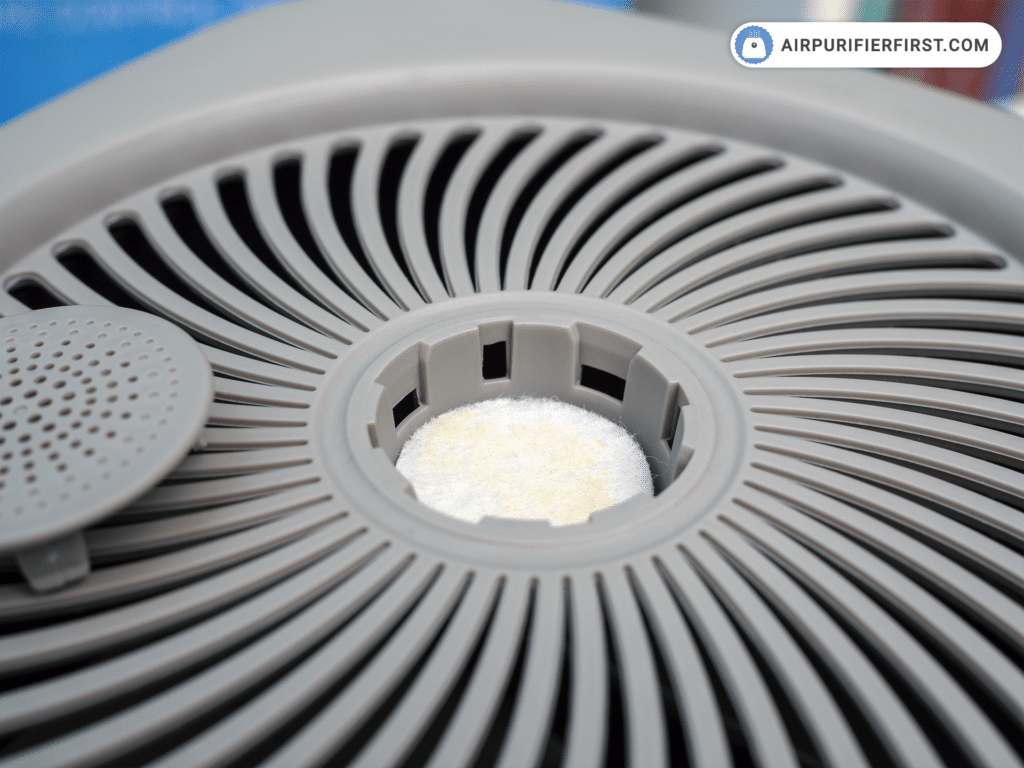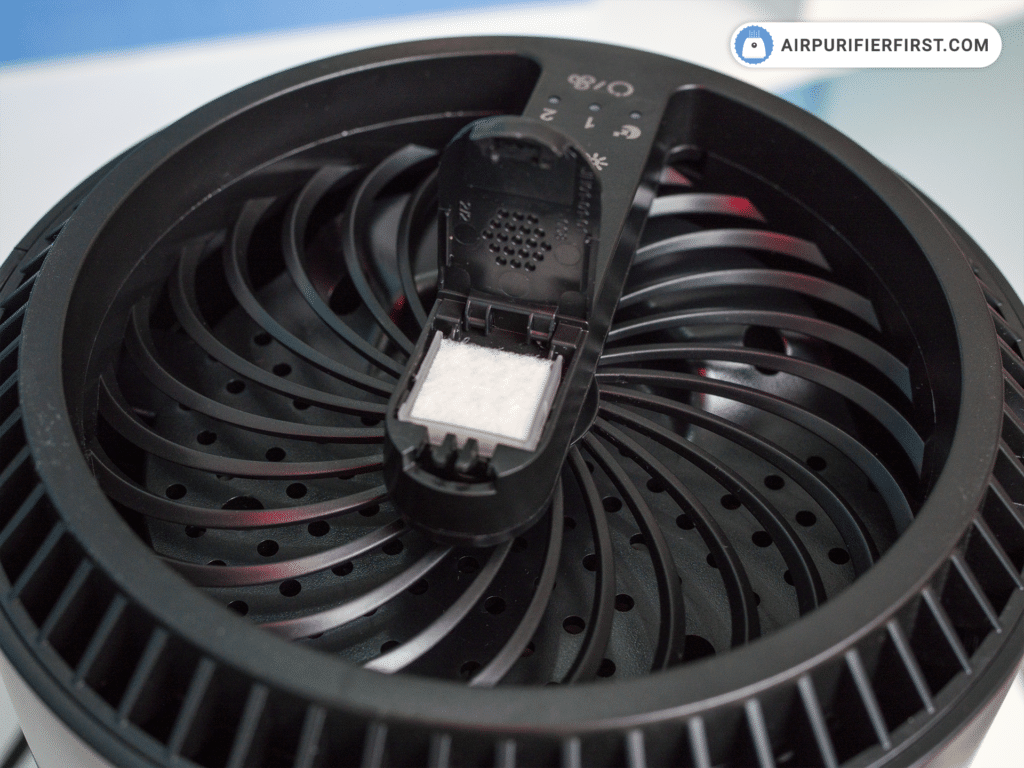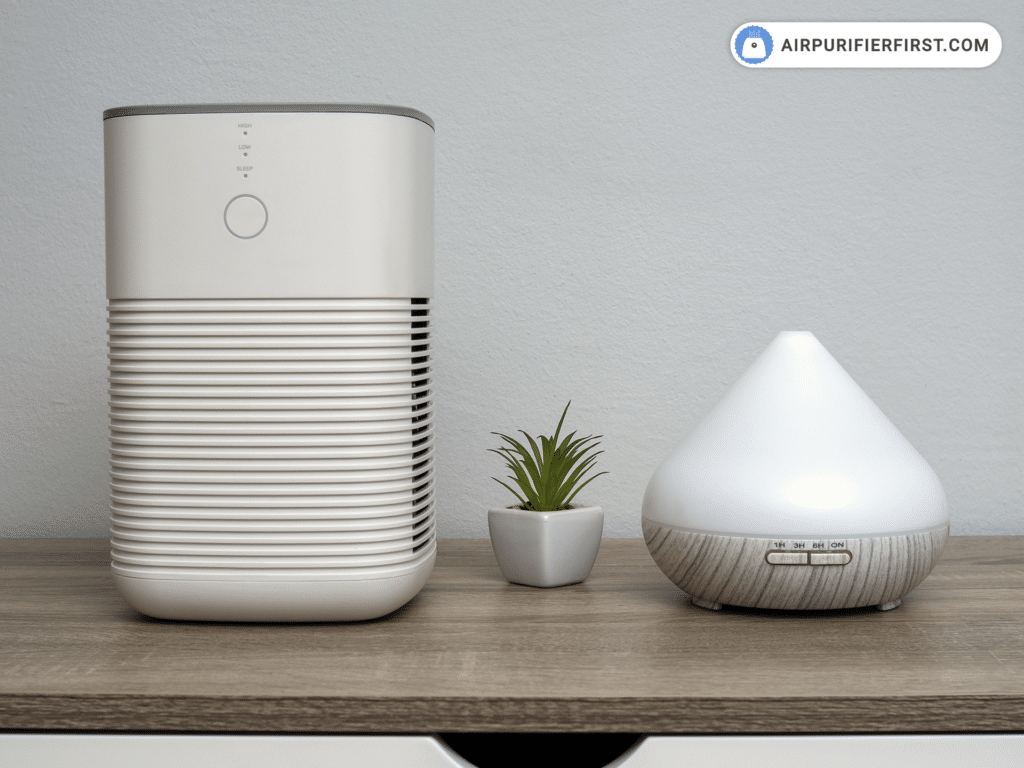Using essential oils in air purifiers is a question that bothers many people. Their pleasant smell would be a great addition to the clean air provided by using an air purifier. But can you actually just pour essential oil into an air purifier?
The short answer is YES, but only if certain conditions are met! In practice, you can put essential oils only in air purifiers that have this option. These types of air purifiers usually have small pads in which you can put a few drops of essential oil.

Table of Contents
- Key Findings on Using Essential Oils With an Air Purifier!
- Is There Any Air Purifier That Works With Essential Oils?
- Difference Between Essential Oil Diffusers and Air Purifiers
- How Do These Devices Work Together?
- Choosing Essential Oils for Your Air Purifier
- FAQ on Using Essential Oils in an Air Purifier
- Final Conclusion
But what about all the other air purifiers? Unfortunately, I wouldn’t recommend putting essential oils in a HEPA filter or anywhere else in an air purifier (without an essential oils pad), as it could damage the device and drastically reduce the filter’s efficiency.
In this article, I’ve analyzed most of the questions and concerns people have about putting essential oils in an air purifier. I also tested how these oils work in combination with air purifiers and whether an air purifier with good filtration technology will neutralize the essential oil from the air.
Key Findings on Using Essential Oils With an Air Purifier!
- Essential oils can be used in air purifiers with an essential oil pad or a similar feature.
- Don’t put essential oils directly into HEPA filters, as it can damage the device and reduce filter efficiency.
- Air purifiers clean the air, while essential oil diffusers add pleasant aromas.
- Using an essential oil diffuser and an air purifier simultaneously is not recommended, as the air purifier can neutralize the essential oil smell.
- Tea Tree, Eucalyptus, Lavender, Citrus, and Ylang Ylang are recommended essential oils for the clean air.
- Diffusers are more effective at spreading essential oil smells than air purifiers with an aroma pad feature.
- It is okay to use a diffuser and a humidifier at the same time.
Is There Any Air Purifier That Works With Essential Oils?
Yes, several air purifiers on the market can diffuse essential oils, and I have had the opportunity to test a few of them. Specifically, I tested the Levoit LV-H128, Aroeve MK01, and Levoit Core Mini, which are compact air purifiers recognized for their affordable prices and the innovative Aroma Pad feature. While there are also other air purifiers available with this feature, I will focus on these two models that I have personally tested and will use for tests I will present in this article.

To use essential oils with these air purifiers, you simply have to add a few drops (I prefer 2-3) onto the Aroma Pad and repeat the process as needed throughout the day. The Aroma Pad is strategically placed in the center of the device, just above the filter, so the purified air passes through the pad and spreads the fragrance of the essential oils in the room.
This Aroma Pad innovation is quite fascinating, and as someone who enjoys innovations in air purifier technology, I find it particularly appealing. However, it’s worth noting that this method is not as effective as using a dedicated essential oil diffuser.

Simply, I noticed that the scent of the essential oils is easily detectable when you’re close to the air purifier, but it doesn’t seem to have a significant impact on the overall aroma of the entire room. I achieved much better results using a separate essential oil diffuser.
Difference Between Essential Oil Diffusers and Air Purifiers
Simply, air purifiers focus on cleaning the air, while essential oil diffusers aim to add pleasant aromas to the air by spreading essential oils throughout the room.
Air purifiers are devices that use specific filtration technologies, typically consisting of a pre-filter, HEPA filter, and activated carbon filter. These filters work together to capture airborne particles and eliminate unpleasant odors from the air, thereby improving indoor air quality.
Essential oil diffusers, on the other hand, serve a different purpose. They generally operate by being filled with water, which is then transformed into a fine mist and released into the air (similar to humidifiers). Adding essential oils to the diffuser allows these fragrances to be easily dispersed throughout the room, creating a pleasant and soothing atmosphere.
How Do These Devices Work Together?
To analyze claims regarding using essential oil diffusers and air purifiers simultaneously, I tested whether these types of devices can work together.

Firstly, I added essential oil to my diffuser, turned it on, and let it run for 20 minutes. Then, I prepared a high-quality air purifier equipped with a True HEPA filter and a pellet-based carbon filter and turned it on at maximum speed while the diffuser continued to work.
Additionally, I placed the Awair Element air quality monitor in the room to measure if there would be any change in the overall air quality. This air quality monitor is great as it measures VOCs, PM2.5, and CO2.
My findings are as follows:
- I noticed that the air purifier neutralized at least 80% of the essential oil smell, suggesting that using these devices together may not be ideal.
- The Awair Element (an air quality monitor I use) didn’t report any significant changes in air quality, nor did the air purifier’s built-in air quality sensor detect any noticeable changes in air quality.
Based on these observations, it appears that using essential oil diffusers and air purifiers together may not be the most effective approach, as the air purifier can significantly reduce the impact of the diffuser’s fragrance.
Choosing Essential Oils for Your Air Purifier
If you want to use essential oils in an air purifier designed for this purpose (that has the Aroma Pad feature), I’ve compiled a list of the best options, which are backed by scientific recommendations.
These essential oils not only provide pleasant smells but also act as bacteria neutralizers, potentially improving overall air quality in your place.
Tea Tree: Derived from the leaves of the Australian Tea Tree, this essential oil is known for its antiseptic, antimicrobial, and anti-inflammatory properties. A research suggests it can kill airborne flu viruses and temporarily reduce airborne mold concentrations.
Eucalyptus: Extracted from the leaves of the eucalyptus tree, this essential oil is a natural cleaner with antimicrobial effects against various bacteria. It is also believed to purify the air by eliminating airborne mold.
Lavender: Renowned for its calming and therapeutic properties, lavender essential oil is a popular choice for diffusers. Its fragrance can help purify the air by neutralizing unpleasant odors, making it an excellent option for allergy sufferers.
Citrus: Sweet orange, lemon, and grapefruit essential oils contain high levels of limonene, which is antimicrobial and effective at destroying airborne germs. These oils also benefit the liver and lymphatic systems, promoting the removal of toxins from the blood.
Ylang Ylang: Extracted from the flowers of the Cananga odorata tree native to Southeast Asia, this essential oil has a sweet, floral, and slightly exotic aroma. A research indicates that ylang ylang supports healthy breathing and counters the effects of air pollution. It is also effective at neutralizing odors.
By putting these essential oils into your air purifier/diffuser, you can create a more refreshing and healthier indoor environment.
FAQ on Using Essential Oils in an Air Purifier
Should I run an air purifier and essential oil diffuser simultaneously?
While it is technically possible to operate both devices simultaneously, it is not recommended. High-quality air purifiers, particularly those with True HEPA and pellet-based carbon filters, can effectively neutralize essential oil fragrances, making the use of both devices counterproductive.
Can a diffuser work as an air purifier?
No, a diffuser can’t work as an air purifier. Diffusers improve the air’s aroma by spreading essential oils, whereas air purifiers clean the air by capturing airborne particles.
How many drops of essential oil should you add to an air purifier?
Typically, 2-3 drops are fine. Adding this amount several times throughout the day can enhance the impact of the essential oil.
Can I put essential oil directly into an air purifier?
You can, but only if the air purifier is designed for essential oil use (if it has the Aroma Pad or another similar option). Don’t add essential oils to the HEPA filter or other parts of the air purifier.
Is it okay to use a diffuser and a humidifier at the same time?
Yes, you can use a diffuser and a humidifier at the same time, as they both add water to the air.
Final Conclusion
Based on my tests, using a diffuser is more effective than an air purifier with an Aroma Pad for refreshing the air with the pleasant smell of essential oils.
Furthermore, I analyzed how essential oils diffusers interact with air purifiers featuring high-quality filtration technology. I discovered that the air purifier neutralizes the essential oil smell, reducing its overall impact. As a result, using a high-efficiency air purifier (equipped with a high-quality carbon filter) and a diffuser simultaneously isn’t recommended.
The answer to this article’s main question, “Can you use essential oils in an air purifier”?, I will just say YES, you can use essential oils with an air purifier, but only with specific models that typically have an essential oil pad feature.
If you have any further questions on this topic, please feel free to leave a comment in the comment section below.
Thank u for the in depth analysis!!
I’m glad you found my article helpful.
Hello I was wondering if it is ok to use 100% natural essential Oils in an air purifier or do I have to dilute it
Hi, I believe using 100% natural essential oils is okay. However, please keep in mind that not every air purifier has the option of adding essential oils to it.